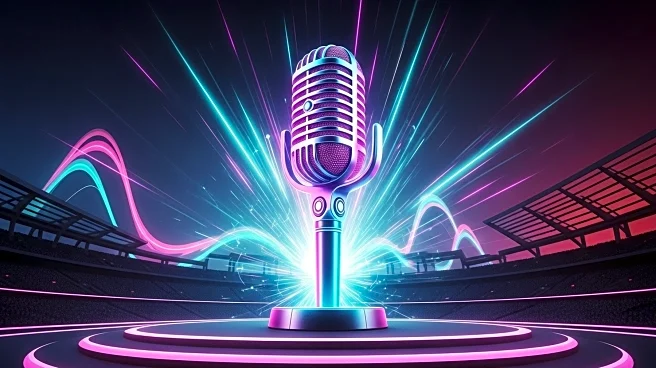What's Happening?
Bad Bunny has been announced as the performer for the 2026 Super Bowl halftime show, a decision that has sparked controversy. The announcement was made by the National Football League and Apple Music during a game between the Green Bay Packers and Dallas Cowboys. Bad Bunny, whose real name is Benito Antonio Martínez Ocasio, will perform at the Super Bowl in Santa Clara, California. Former race car driver Danica Patrick criticized the choice, expressing her disapproval of non-English songs at such a major American event. Bad Bunny has previously canceled tour dates in the U.S. due to concerns about ICE agents at his concerts. NFL executive Jon Barker defended the decision, highlighting Bad Bunny's global influence and ability to connect with diverse audiences.
Why It's Important?
The selection of Bad Bunny for the Super Bowl halftime show underscores the NFL's efforts to embrace global music trends and cultural diversity. This decision may impact the league's viewership, attracting a broader audience that appreciates Bad Bunny's music. However, it also raises questions about cultural representation and the role of English-language music in American events. The controversy surrounding Bad Bunny's past comments and political affiliations could influence public perception and spark debates about inclusivity and cultural identity in sports entertainment.
What's Next?
The NFL may face continued scrutiny and debate over its choice of halftime performers, especially as it navigates cultural and political sensitivities. Stakeholders, including fans and sponsors, might react differently based on their views on cultural representation. The league will likely monitor public sentiment and adjust its strategies to balance entertainment value with cultural inclusivity. Bad Bunny's performance could set a precedent for future halftime shows, influencing the selection of artists who represent diverse backgrounds.
Beyond the Headlines
The decision to feature Bad Bunny highlights broader cultural shifts in the U.S., where Latin music and artists are gaining mainstream popularity. This move could encourage other major events to diversify their entertainment choices, reflecting changing demographics and cultural tastes. It also raises ethical considerations about the role of entertainment in bridging cultural divides and promoting inclusivity.










